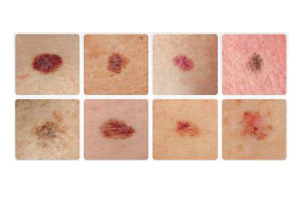If you have skin, you’re at risk for melanoma. Even so, 76 percent of Americans have not had a skin cancer check by a dermatologist.
Skin screening is crucial since melanoma (the deadliest form of skin cancer) is curable when caught in the beginning, treatable stages.
At UConn Health Center, dermatologists use a range of technologies to track and visualize changes within the skin, including changes on the cellular level.
To make an appointment:
Call 860-679-4600
UConn Health Center
21 South Road, Second Floor
Farmington
Recently, the Health Center became the first dermatology practice in the region to introduce the use of MelaFind, a computer-aided technology that allows dermatologists to see below the skin, evaluate lesions in 3D imaging and determine if a biopsy is necessary.
“This is an amazing technology that can look through the skin and identify the telltale signs of melanoma,” says Dr. Jane Grant-Kels, chair of the Department of Dermatology at the UConn Health Center. “With this technology, patients can be spared needless biopsies. Ultimately, that is easier on patients, as even a small incision can result in pain, scarring or embarrassing bandages.”
Melanoma Most Deadly
All types of skin cancer are serious, though melanoma is the most deadly. Early detection is critical.
Often the first sign of melanoma is a change in the size, shape, color, or feel of a mole. Most melanomas have a black or black-blue area. Melanoma may also appear as a new mole. It may be black, abnormal, or “ugly looking.”
Thinking of “ABCDE” can help you remember what to watch for:
- Asymmetry – the shape of one half does not match the other
- Border – the edges are ragged, blurred or irregular
- Color – the color is uneven and may include shades of black, brown and tan
- Diameter – there is a change in size, usually an increase
- Evolving – the mole has changed over the past few weeks or months
Surgery is the first treatment of all stages of melanoma. Other treatments include chemotherapy and radiation, biologic, and targeted therapies. Biologic therapy boosts your body’s own ability to fight cancer. Targeted therapy uses substances that attack cancer cells without harming normal cells.
Follow the UConn Health Center on Facebook, Twitter and YouTube.



